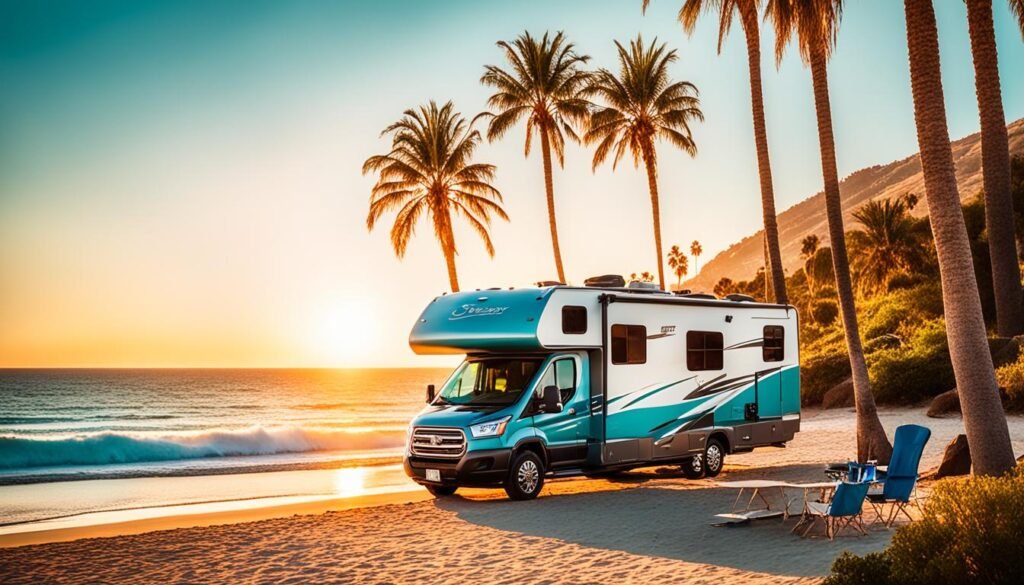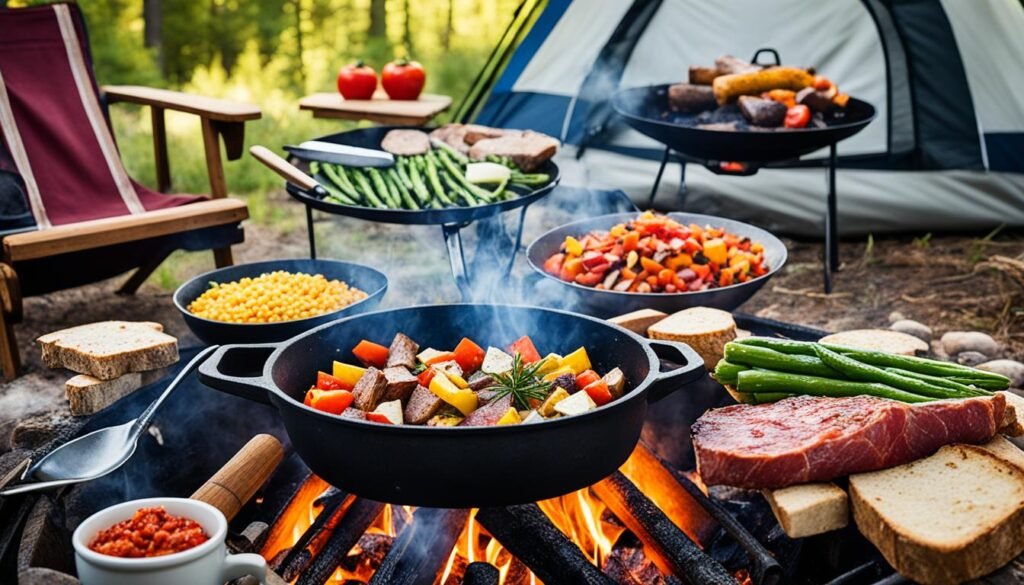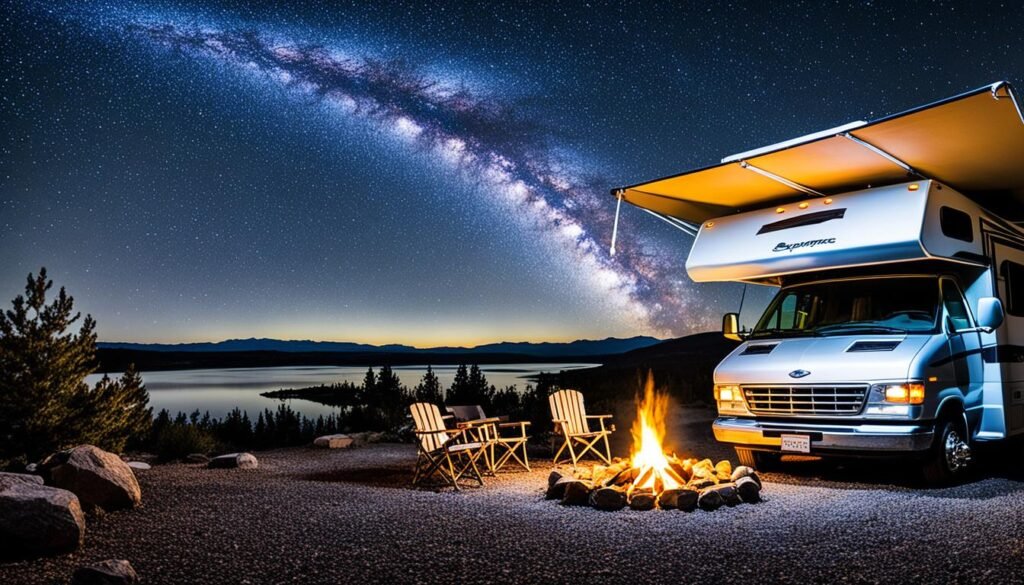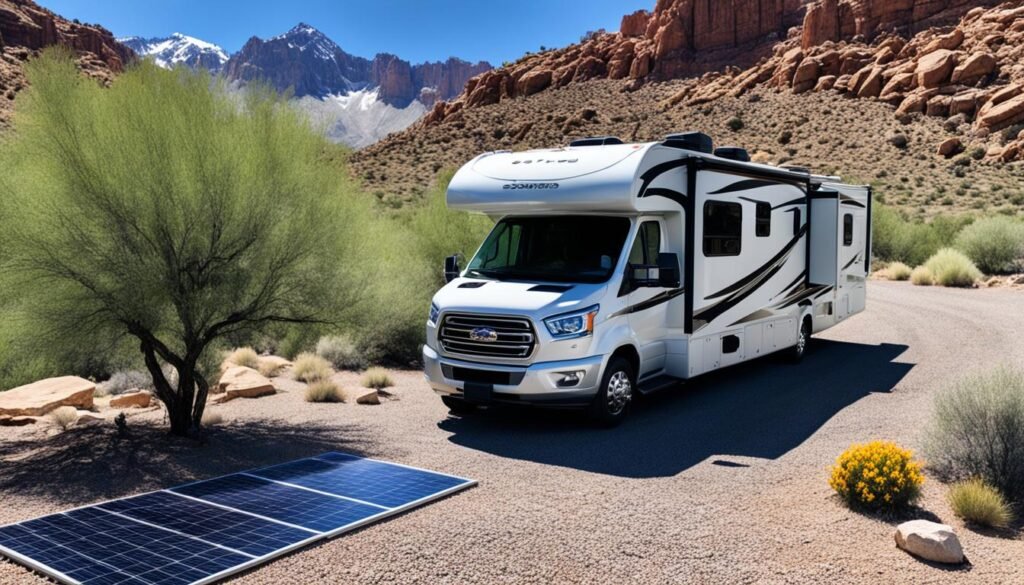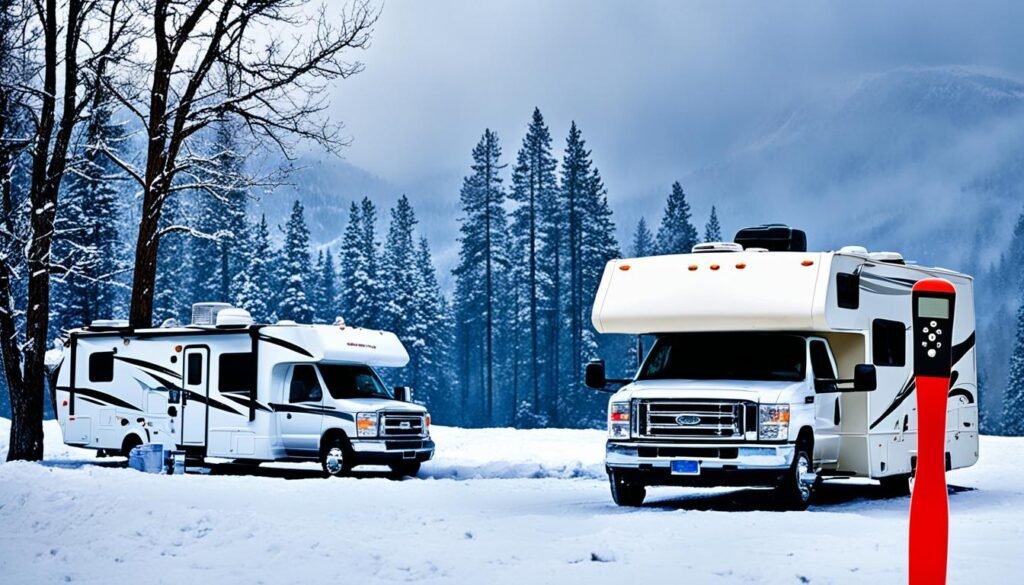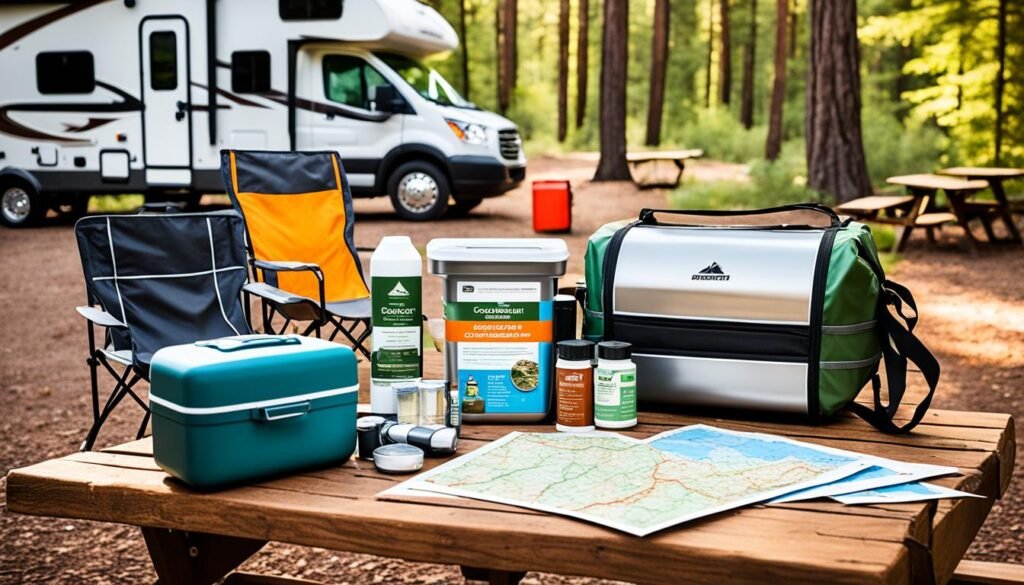Hello, fellow RV enthusiasts! Planning an RV trip is exciting. It lets you explore outdoors with home comforts. Yet, knowing the risks and how to stay safe is key for fun.
There are many things to think about for safety at RV campsites. Protecting your RV and stuff is important. Also, knowing how to stay safe while traveling and at the campground matters. Being ready and informed makes your trip worry-free.
Key Takeaways:
- Assess the potential risks and safety measures before embarking on an RV camping trip.
- Implement campground safety precautions to enhance security for yourself and your fellow campers.
- Follow safe RV travel tips to ensure a smooth and pleasant journey.
- Take proactive measures to protect your RV and belongings while camping.
- Stay informed about RV park security and adhere to safe camping practices.
The Importance of RV Park Safety Inspections
Making sure your guests are safe is very important. Checking the RV park regularly helps find and fix risks. This makes the park safe and fun for everyone.
Experts check different parts of the RV park during these inspections. They look at the buildings, services, and safety gear. This helps find any dangers or problems that could harm people.
By finding risks early, park owners can stop accidents before they happen. They might fix or update safety gear like fire extinguishers. They also look for electrical problems or gas leaks. This makes camping safer.
It’s important to follow safety rules during inspections. RV parks follow guidelines from groups like the NFPA and EPA. This ensures all safety steps are followed. It keeps guests safe and gives them peace of mind.
Regular safety checks also build a safety culture in the park. By always checking for risks, the park can fix them early. This makes guests feel secure and happy during their stay.
Doing safety checks shows you care about your guests’ safety. It keeps your RV park’s name in good standing. With safety as a top concern, guests can unwind and have a good time, knowing they’re well looked after.
Adherence to RV Park Safety Guidelines and Regulations
Keeping RV parks safe is very important. By following safety rules, you keep everyone secure and happy. Let’s talk about what’s important for RV park safety.
1. National Fire Protection Association (NFPA) Compliance
Following NFPA guidelines keeps your park safe from fires. This means checking fire extinguishers and safety systems often. It also means doing regular fire safety checks.
2. Environmental Protection Agency (EPA) Protocols for Clean Drinking Water Management
It’s important to keep the water clean for guest health. Using EPA methods ensures the water is safe to drink. This involves testing water, keeping plumbing sanitary, and handling waste safely.
3. Sewage and Waste Management in Compliance with State and Local Regulations
Managing sewage and waste well keeps your park clean. Following local rules makes sure systems work right. Regular checks help avoid health risks.
Following all these safety rules is key. It shows you care about safety, health, and the environment. Guests will trust your park more, knowing it’s safe and well-managed.
Developing an RV Park Safety Checklist
Creating an RV park safety checklist is key for guest and staff well-being. By checking your park’s setup and emergency plans, you make it safe for all.
Infrastructure Safety
Regular checks on park structures are a must. This means looking at fire extinguishers, electrical and water systems to keep them working right. Fix any issues quickly to prevent accidents and keep everyone safe.
Emergency Readiness
Preparing for emergencies is vital in an RV park. Your checklist should cover plans for natural disasters, medical issues, and fires. Make sure your team knows what to do in these situations.
“Safety doesn’t happen by accident. It’s a result of careful planning and proactive measures.”
Practice drills and share emergency info with guests. Doing this makes sure everyone knows what to do when trouble comes. And, having clear emergency details helps a lot.
Guest and Employee Safety
Keeping guests and staff safe is very important. Think about using more lights, secure systems, and cameras to stop dangers. Training everyone on safety rules helps prevent accidents too.
Guest safety also involves clear signs on how to use the park safely. If your park has pools or playgrounds, set clear rules for them to cut down risks.
Continual Evaluation
Updating your RV park safety checklist is a continuous job. Recheck and improve it often to keep up with new safety needs. Ask for guest and staff feedback to make your park better.
By making and using an RV park safety checklist well, you look after everyone’s safety. You cover everything from park safety, emergency plans, to keeping guests and workers safe. A good checklist makes your park a safe and fun place.
To learn more about safety in RV parks, check the National Park Service’s campground safety guidelines.
Enhanced Safety Measures at RV Parks
RV parks should go the extra mile for camper safety. Added safety steps bring peace of mind. They make camping fun for everyone.
RV Park Sanitation Guidelines
Cleanliness is key at recreational vehicle parks. Complying with sanitation rules helps fight germs. It keeps campers healthy.
Cleaning and disinfecting areas often is important. Hand sanitizing stations are also a big help. They fight illness spread.
Regular Maintenance
Maintenance keeps camping safe and fun. Owners should check facilities often for any problems. This includes electrical and plumbing checks.
Fixing issues quickly helps prevent accidents. It keeps the park in top shape.
RV Park Security Measures
A secure environment is crucial. RV parks need good security for campers and their things. Good lighting and cameras help a lot.
They reduce accidents and keep away thieves. Security measures make campers feel safe.
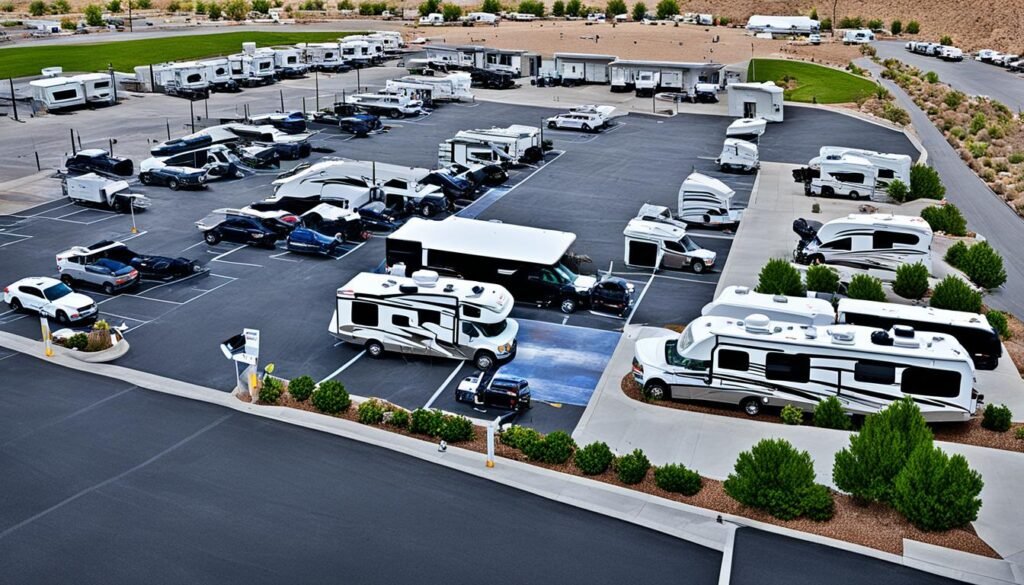
“Safety measures make RV parks secure and fun. Cleanliness, maintenance, and security are key. They ensure a great camping trip for everyone.”
RV park owners should focus on safety. This includes cleanliness, maintenance, and security. These steps keep campers happy and the park reputable.
Emergency Preparedness in RV Parks
RV parks must be ready for emergencies. This includes natural disasters and medical emergencies. Having plans for these situations can save lives and limit damage. Owners should focus on procedures, staff training, and teaching campers. This ensures everyone knows what to do.
Emergency plans tell staff and campers how to act in bad situations. They show where to go, how to communicate, and what to use in emergencies. Clear guidelines help keep everyone calm. This keeps the park safe.
Training staff is very important for being prepared. Staff with good training can handle emergencies and keep calm. They learn first aid, how to talk during emergencies, and how to manage incidents. Knowing their roles helps them work together in emergencies.
Campers should also learn about emergencies. They need to know who to call, where to go, and what services are there for them. Learning about emergencies and first aid helps campers. They can help themselves and others if needed.
“Being prepared for emergencies is important. It keeps guests and staff in RV parks safe. Good plans, training, and teaching about safety make a secure place.”
It’s key to have emergency kits in the park. Kits should have first aid items, flashlights, batteries, tools, and ways to talk. Kits help with the first response and keeping in touch in emergencies.
Emergency Preparedness Checklist for RV Parks:
- Make detailed plans for different emergencies like natural disasters and fires.
- Teach staff about emergency steps, first aid, and handling incidents.
- Show campers what to do in emergencies, including how to get out and who to call.
- Put emergency kits in many places with what you need in them.
- Do drills to see if the plans work well.
- Keep clear ways to talk and meet-up points for staff and campers in emergencies.
- Update the plans often with new ideas and feedback.
RV parks that care about being ready for emergencies make a safe place. Good plans, teaching staff and campers, and having what you need means parks are ready. Everyone is safer because of it.
| Emergency Preparedness Tips | Why It’s Important |
|---|---|
| Develop comprehensive emergency response plans for various scenarios. | Guides staff and campers on what to do during emergencies, minimizing panic and confusion. |
| Train staff members on emergency procedures, first aid, and CPR. | Equips staff with the necessary skills and knowledge to handle emergencies efficiently. |
| Educate campers on emergency protocols, including evacuation routes and on-site emergency services. | Empowers campers to respond effectively and proactively during urgent situations. |
| Ensure emergency kits are readily available throughout the park. | Allows for immediate response, addressing immediate needs and maintaining communication. |
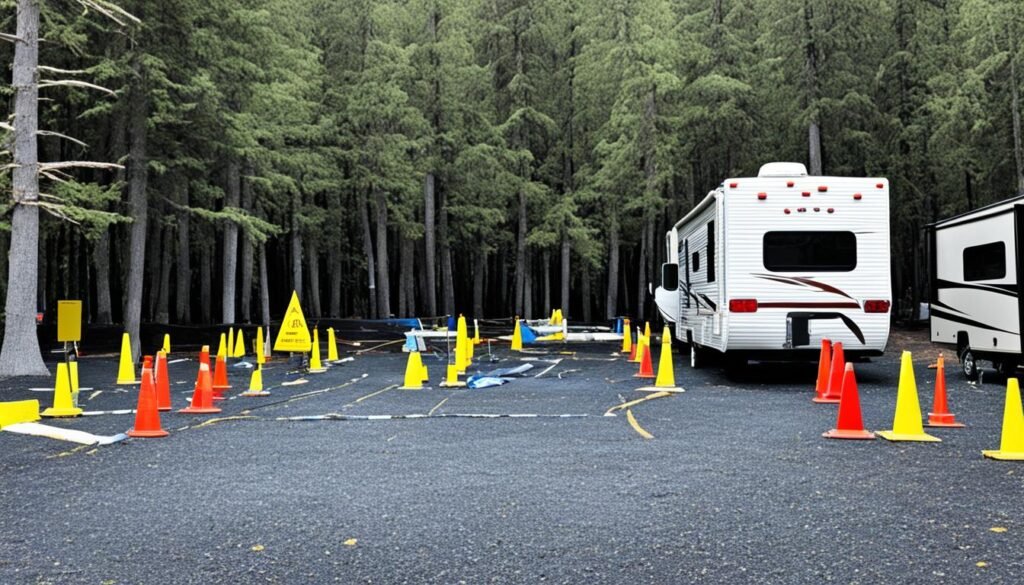
Incorporating COVID-19 Precautions
RV parks must keep guests and staff safe during the COVID-19 pandemic. It’s essential to have strong COVID-19 precautions in RV parks. This helps lower virus risks and ensures safe camping.
Adopting social distancing is a key step. RV parks should have rules to keep campers apart. They can space RV sites more or limit the number of guests in shared spaces.
Having better cleaning protocols is also vital. Clean common surfaces and areas like bathrooms often. Use EPA-approved cleaners to keep the environment safe and clean.
RV parks can use contactless check-ins to avoid close contact. Online bookings and self-service kiosks can make check-ins safer and easier.
Telling campers about COVID-19 precautions is very important. Use signs, websites, and emails to share safety rules. This helps campers know and follow the guidelines.
Keeping up with guidelines and regulations from health experts is important. As things change, RV parks should update their safety measures. This ensures everyone’s safety at all times.
Educating Campers on RV Park Safety Guidelines
Education is key in keeping campers safe at RV parks. With clear safety guidelines, campsites can cut down accidents. Fire safety, electrical safety, and propane safety are crucial. They help make camping safe for everyone.
Fire safety is a must in RV parks. Teaching campers how to prevent fire is important. They should keep flammables away from flames and use fire pits. Fire extinguishers must be easy to find. Campers also need to know how to use them.
Electrical safety matters a lot when RV camping. Campers must learn about proper hook-ups and not overloading circuits. They should use surge protectors. Turning off unused appliances prevents accidents.
Propane safety is key for those with propane RV appliances. Campers must know how to handle propane tanks safely. Checking for leaks and keeping flames away is vital. They should never mess with tank fittings.
Teaching campers about these safety tips helps create a safe RV park. This way, everyone can enjoy their stay without worry.
Quick Tips for RV Park Safety
- Always have a working fire extinguisher in your RV.
- Follow the designated pathways and avoid walking over electrical cables.
- Keep flammable materials away from open flames.
- Regularly inspect and maintain your propane system.
- Be cautious when using any electrical appliances in wet conditions.
- Follow the campground’s rules and regulations to ensure a safe and enjoyable stay.
Addressing RV Camping Risks
RV camping is fun but comes with its own risks. It’s important to know these risks before your trip. Being prepared can make your adventure safe and fun. Here’s what you need to think about:
- Uncertain weather: Nature is full of surprises, especially the weather. You should pack raincoats and extra blankets to be ready for anything.
- Accident risks while driving: Accidents can happen on the road. To stay safe, drive in the daytime, don’t get distracted, and follow speed limits.
- Use of shared facilities: RV parks have shared bathrooms and showers. Keep illnesses away by washing your hands a lot and using hand sanitizers.
- Maintenance issues: Keep your RV in good shape to avoid breakdowns. Fix any problems right away for a smoother trip.
Taking steps to stay informed and safe will help you enjoy your RV camping without worries.
RV Delivery as a Safer Option
Many campers now choose RV delivery for a safer, more convenient vacation. This trend removes the hassle of long drives and upkeep issues. With RV delivery, your RV is ready at the campground so you can enjoy vacation immediately.
RV delivery boosts safety by cutting down long drives in big, unfamiliar RVs. It helps avoid accidents on the road. This is great for those not used to driving large RVs or on tough roads. Now, campers can just enjoy their time outdoors without worry.
RV delivery also helps save money. It removes the need to rent or own an RV and its upkeep. Campers save on tasks like engine checks and tire rotations. This means more time and money for fun.
It can also mean cheaper insurance rates. Delivered RVs at campsites might get lower insurance costs. This is another way RV delivery saves campers money.
Consider RV delivery for a stress-free RV vacation. It brings convenience, safety, and savings. RV delivery is a top choice for campers today.
FAQ
How safe is RV camping?
RV camping is quite safe with the right steps. First, always check that everything is safe for guests. This means inspecting the RV park often and following safety rules. Also, having a plan for emergencies is key.
Teaching campers about safety is very important too. This helps everyone know how to avoid dangers and stay safe.
What is the importance of RV park safety inspections?
Safety checks at RV parks are very important. They help find and fix any safety problems. This keeps everyone safe and makes sure emergency equipment works right.
Doing these checks often and training staff on them keeps the park safe. It also makes guests feel more at ease.
Why is adherence to RV park safety guidelines and regulations important?
Following safety rules is crucial for RV parks. It means they meet important safety standards. Guidelines from the NFPA and EPA help a lot.
They ensure fire safety and clean water. This makes the park both safe and green.
How can I develop an RV park safety checklist?
Making an RV park safety checklist is a must. It should focus on safety, being ready for emergencies, and inspecting things regularly. Doing this helps keep guests and staff safe.
It also teaches everyone about safety and emergency steps. This way, the park stays safe for all.
What are some enhanced safety measures that should be implemented in RV parks?
RV parks should do more than the basics for safety. This includes cleaning well, keeping things in good shape, and having good security. Security means good lighting, cameras, and keeping the park secure.
These steps make sure everyone is safe and feels secure.
How can RV parks prepare for emergencies?
RV parks must have plans for emergencies. This means knowing what to do if something bad happens. Training staff and informing campers about emergencies is important.
Having the right supplies and information ready helps a lot. This makes sure the park is ready for any problem.
What COVID-19 precautions should be implemented in RV parks?
RV parks need to be careful because of COVID-19. They should keep people apart, clean more, and let people check in without touching anything. It’s also important to tell campers about these steps.
Keeping up with the latest health advice helps too. This makes sure the park stays safe for everyone.
How can campers be educated on RV park safety guidelines?
Teaching campers about safety rules is very important. They should know about fire, electrical, and general safety. This helps prevent accidents.
Knowing what to do in an emergency is crucial. This way, campers can keep safe while enjoying their stay.
What risks should I be aware of while RV camping?
Be aware of weather changes, accidents while driving, using shared places, and RV issues. Drive in daylight and don’t rush when driving. Fix any problems with your RV quickly.
These steps help lower the risks. This makes your RV camping trip safer.
Is RV delivery a safer option for camping?
RV delivery is becoming popular and may be safer. It avoids driving and fixing problems. This lowers the chance of accidents.
It can also save money on insurance. The RV is ready at the campsite. This makes the camping trip easier and safer.


